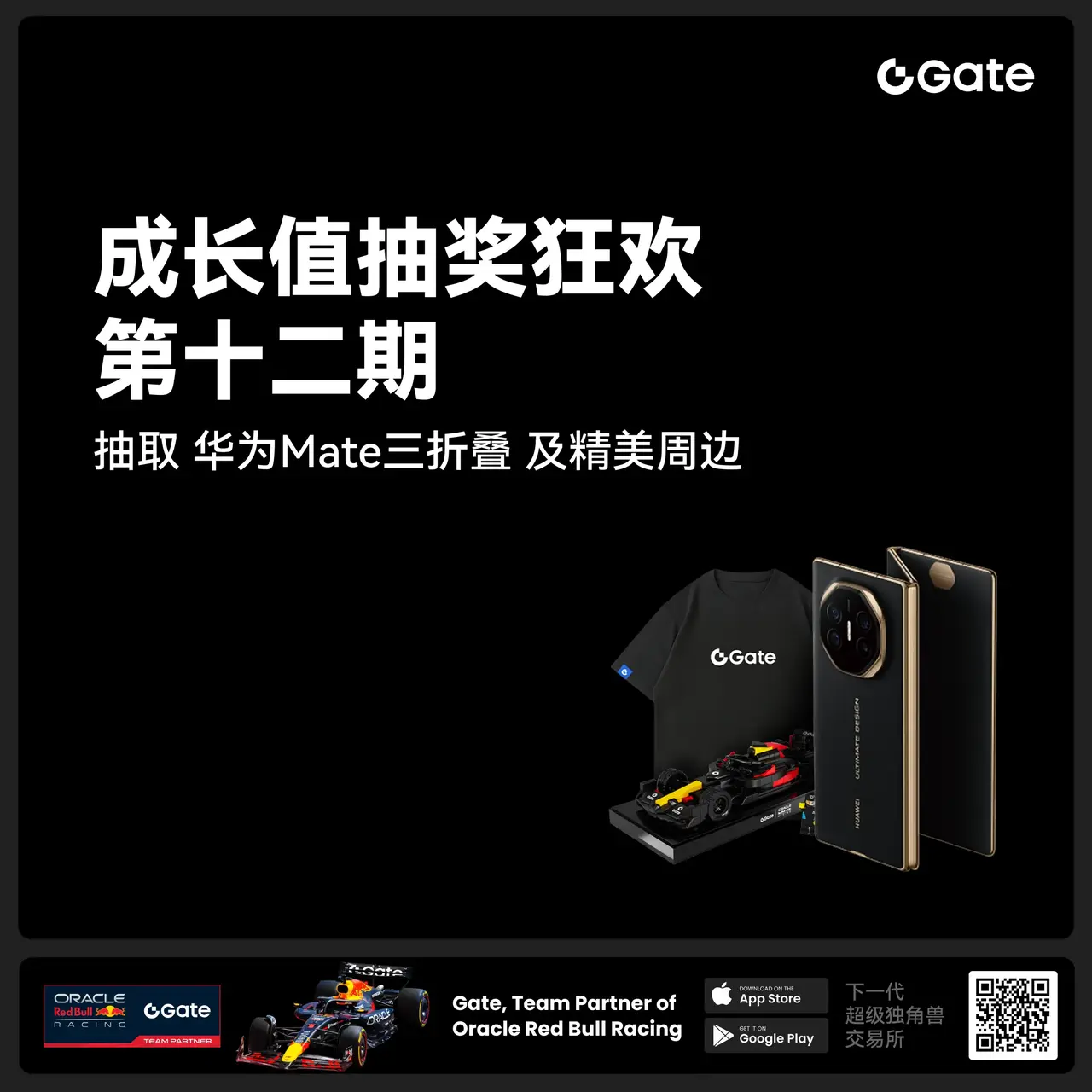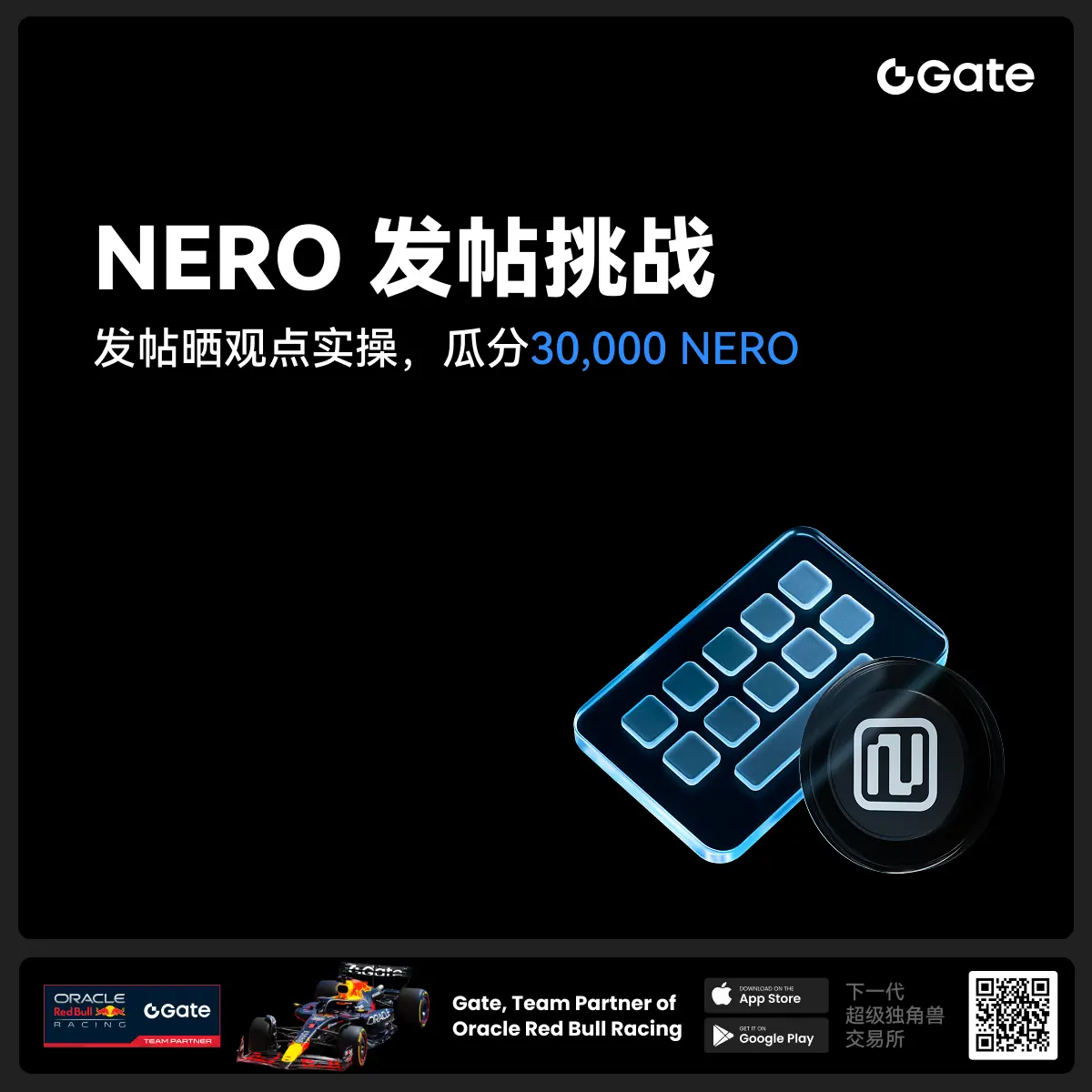- 話題1/3
44208 熱度
31651 熱度
47552 熱度
8103 熱度
21806 熱度
- 置頂
- 🎉 #CandyDrop合约挑战# 正式開啓!參與即可瓜分 6 BTC 豪華獎池!
📢 在 Gate 廣場帶話題發布你的合約體驗
🎁 優質貼文用戶瓜分$500 合約體驗金券,20位名額等你上榜!
📅 活動時間:2025 年 8 月 1 日 15:00 - 8 月 15 日 19:00 (UTC+8)
👉 活動連結:https://www.gate.com/candy-drop/detail/BTC-98
敢合約,敢盈利
- 🎉 攢成長值,抽華爲Mate三折疊!廣場第 1️⃣ 2️⃣ 期夏季成長值抽獎大狂歡開啓!
總獎池超 $10,000+,華爲Mate三折疊手機、F1紅牛賽車模型、Gate限量週邊、熱門代幣等你來抽!
立即抽獎 👉 https://www.gate.com/activities/pointprize?now_period=12
如何快速賺成長值?
1️⃣ 進入【廣場】,點擊頭像旁標識進入【社區中心】
2️⃣ 完成發帖、評論、點讚、發言等日常任務,成長值拿不停
100%有獎,抽到賺到,大獎等你抱走,趕緊試試手氣!
截止於 8月9日 24:00 (UTC+8)
詳情: https://www.gate.com/announcements/article/46384
#成长值抽奖12期开启#
- 📢 Gate廣場 #NERO发帖挑战# 秀觀點贏大獎活動火熱開啓!
Gate NERO生態周來襲!發帖秀出NERO項目洞察和活動實用攻略,瓜分30,000NERO!
💰️ 15位優質發帖用戶 * 2,000枚NERO每人
如何參與:
1️⃣ 調研NERO項目
對NERO的基本面、社區治理、發展目標、代幣經濟模型等方面進行研究,分享你對項目的深度研究。
2️⃣ 參與並分享真實體驗
參與NERO生態周相關活動,並曬出你的參與截圖、收益圖或實用教程。可以是收益展示、簡明易懂的新手攻略、小竅門,也可以是行情點位分析,內容詳實優先。
3️⃣ 鼓勵帶新互動
如果你的帖子吸引到他人參與活動,或者有好友評論“已參與/已交易”,將大幅提升你的獲獎概率!
NERO熱門活動(帖文需附以下活動連結):
NERO Chain (NERO) 生態周:Gate 已上線 NERO 現貨交易,爲回饋平台用戶,HODLer Airdrop、Launchpool、CandyDrop、餘幣寶已上線 NERO,邀您體驗。參與攻略見公告:https://www.gate.com/announcements/article/46284
高質量帖子Tips:
教程越詳細、圖片越直觀、互動量越高,獲獎幾率越大!
市場見解獨到、真實參與經歷、有帶新互動者,評選將優先考慮。
帖子需原創,字數不少於250字,且需獲得至少3條有效互動
- 🎉 親愛的廣場小夥伴們,福利不停,精彩不斷!目前廣場上這些熱門發帖贏獎活動火熱進行中,發帖越多,獎勵越多,快來GET你的專屬好禮吧!🚀
1️⃣ #GateLaunchpad上线IKA# |IKA認購體驗
在Gate廣場帶話題曬出你的IKA Launchpad認購體驗,4位幸運分享者講瓜分$200分享獎池!
詳情 👉️ https://www.gate.com/post/status/12566958
2️⃣ #ETH冲击4800# |行情分析預測
大膽發帖預測ETH走勢,展示你的市場洞察力!10位幸運用戶將平分0.1 ETH 獎勵!
詳情 👉️ https://www.gate.com/post/status/12322403
3️⃣ #创作者活动第二期# |ZKWASM話題
在廣場或推特發布與 ZKWASM 或其交易活動相關的原創內容,瓜分4,000枚ZKWASM!
詳情 👉️ https://www.gate.com/post/status/12525794
4️⃣ #Gate广场征文活动第二期# |ERA話題
談談你對ERA的觀點/體驗,參與並推廣活動,700 ERA大獎等你贏!
詳情 👉️ https://www.gate.com/post/status/12361653
5️⃣ #MBG任务挑战# |MBG話題
分享你對MBG的洞察,積極參與和推廣MBG活動,20位小 - 🎉Gate 2025 上半年社區盛典:內容達人評選投票火熱進行中 🎉
🏆 誰將成爲前十位 #Gate广场# 內容達人?
投票現已開啓,選出你的心頭好
🎁贏取 iPhone 16 Pro Max、限量週邊等好禮!
📅投票截止:8 月 15 日 10:00(UTC+8)
立即投票: https://www.gate.com/activities/community-vote
活動詳情: https://www.gate.com/announcements/article/45974
Andreessen Horowitz warns of loopholes in draft crypto rules
Venture capital firm Andreessen Horowitz (a16z) is calling on US lawmakers to revise a draft crypto regulation bill, warning that the proposed framework could open dangerous loopholes and undermine investor protections.
In a Thursday open letter to the US Senate Banking Committee, the investment firm suggests that the regulators should close loopholes in the draft crypto legislation. The letter is a response to the discussion draft released in late July.
The discussion draft in question builds on the 21st Century Financial Innovation and Technology Act (CLARITY Act) and seeks industry input on the ongoing crypto regulation. A16z points to the definition of ancillary assets, referring to tokens sold with an investment contract that give buyers no equity, dividend or governance rights.
“The ancillary asset construct should not serve as the foundation for legislation without significant modifications,” the letter reads.
A16z pushes for “digital commodity” model
A16z said the current approach fails to resolve the core issues facing crypto markets and would be incompatible with the Howey test, the long-standing legal benchmark for defining securities.
The investment firm said this approach “will not resolve the challenges facing crypto market participants.” Instead, the firm recommends adopting the CLARITY Act’s narrower “digital commodity” framework, which it says would provide greater certainty while preserving regulatory simplicity.
A16z also claimed that “the Howey test remains a critical component of US securities law” and should remain in its current form. Its suggested solution is to “codify a modernized application suited to ancillary assets.”
It described the proposed changes to the Howey test as “unnecessary—and dangerous—because it seeks to rewrite Howey in a way that departs from settled law and undermines investor protections”:
Insider sales should be limited
A16z also said that applying securities law to primary transactions and commodity regulations for secondary transactions creates a loophole, allowing issuers to sell ancillary assets to insiders under exemptions, and then resell in the public market without falling under securities regulations.
As a solution, the investment firm suggested requiring the projects to achieve decentralization by eliminating mechanisms of control. Applying transfer restrictions through those means “can close loopholes that would otherwise arise,” the letter states.
According to a16z, this would also prevent insider enrichment at the expense of public investors and ensure that the distinction between the primary and secondary markets remains meaningful:
Related: Trump plans to pick a16z head of policy Brian Quintenz as CFTC chair: Report
A control-based decentralization framework
The firm suggests that regulators should adopt a control-based decentralization framework, which it says “is the appropriate way to evaluate the evolution of an ancillary asset’s risk profile.”
The letter explains that this approach “should be focused on whether any party retains unilateral authority—operational, economic, or governance—over the blockchain system.” This, according to the investment firm, should be considered when applying the Howey test:
Protect the plumbers, not the pipes
A16z further says that the US Securities and Exchange Commission’s (SEC) past focus on the “efforts of others” aspect of the Howey test “has created significant perverse incentives.”
It claims this leads to lower transparency, exposes users to undisclosed risks and stalls innovation. The letter also suggests that being involved with the technology at the basis of crypto should not infringe on securities law.
“Legislation should clarify that core technology functions necessary for the operation of decentralized blockchain systems — such as running consensus algorithms, mining, staking, and executing smart contracts — do not, in and of themselves, constitute regulated financial activity under U.S. securities or commodities laws,” the firm said.
Magazine: How crypto laws are changing across the world in 2025